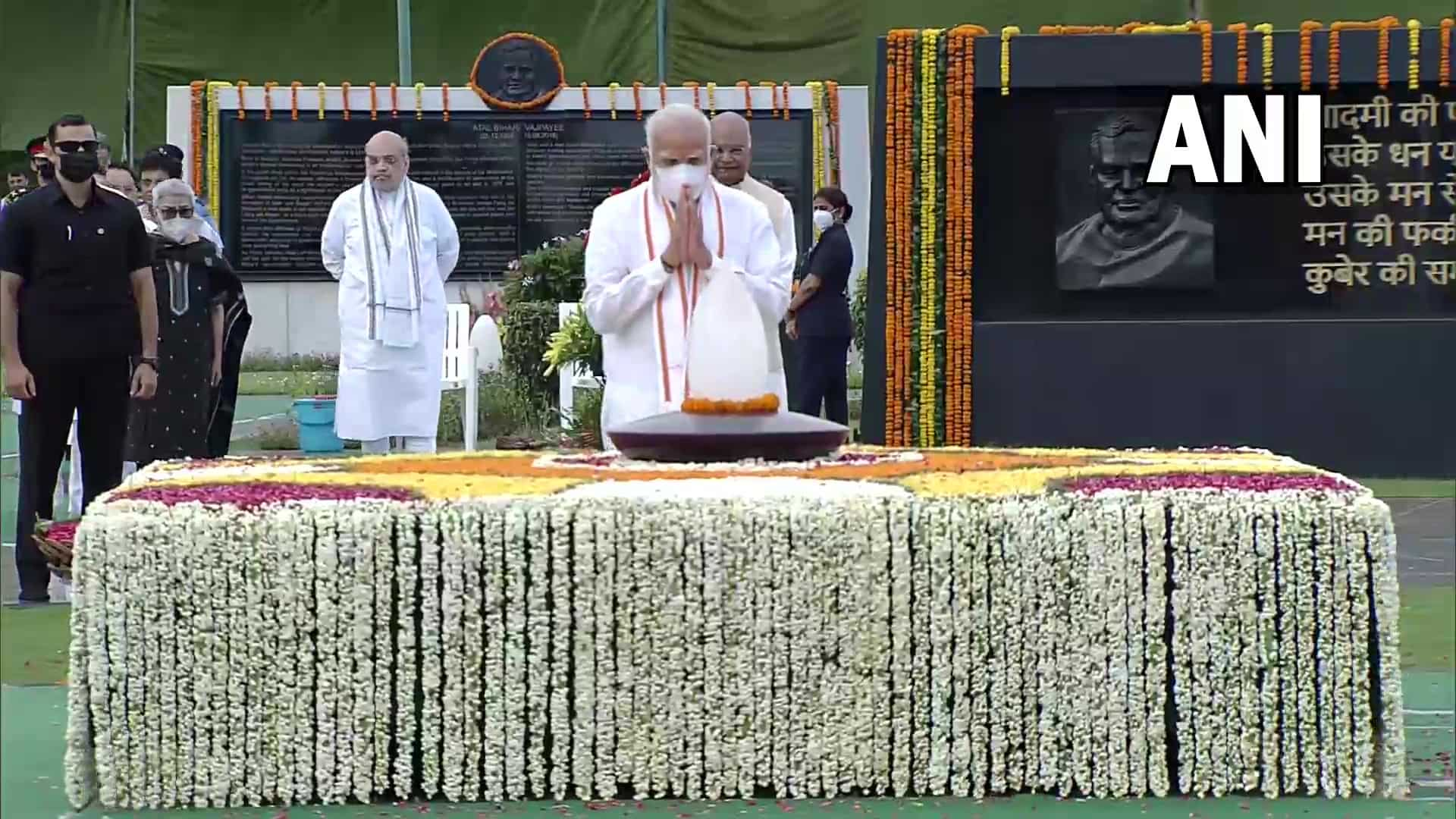


President Droupadi Murmu and Prime Minister Narendra Modi along with other dignitaries paid tributes to former Prime Minister Atal Bihari Vajpayee on his death anniversary. Vajpayee, known for his exemplary oratory skills, was crucial in forming alliances for his party in the coalition era of the 90s and made history by becoming the first BJP Prime Minister. His leadership from 1998 to 2004 is remembered for bringing about reforms and development in the infrastructure sector. Vajpayee passed away in 2018 at the age of 93.
Atal Bihari Vajpayee: Remembering the Visionary Leader on His Death Anniversary
On the occasion of the 4th death anniversary of former Prime Minister Atal Bihari Vajpayee, the nation pays homage to one of its most iconic leaders. Vajpayee, a towering figure in Indian politics, left an enduring legacy as a champion of development, diplomacy, and communal harmony.
Background
Born on December 25, 1924, in Gwalior, Vajpayee was a staunch supporter of the Bharatiya Jana Sangh, the predecessor of the Bharatiya Janata Party (BJP). His political career spanned over six decades, during which he held various ministerial positions in the Janata Party government under Morarji Desai.
In 1996, Vajpayee became the first BJP Prime Minister of India. His tenure was marked by a period of economic and political stability. Vajpayee introduced key reforms in infrastructure, notably the Golden Quadrilateral Highway project, and played a pivotal role in strengthening India's relations with Pakistan and other neighboring countries.
Death Anniversary Tributes
On August 16, 2022, President Droupadi Murmu, Prime Minister Narendra Modi, and other dignitaries paid tributes to Vajpayee at the "Sadbhavana Manch" in New Delhi. Modi hailed Vajpayee as a "great leader who shaped the destiny of India" and emphasized his unwavering commitment to national unity and progress.
Legacy and Impact
Vajpayee's legacy continues to inspire Indian politics and governance. His emphasis on "politics of consensus" and his ability to forge alliances across ideological divides are considered a hallmark of his leadership. His diplomatic initiatives, including the Lahore Declaration with Pakistan, laid the groundwork for peace and cooperation in the region.
Vajpayee also played a significant role in the development of the BJP, transforming it from a right-wing organization into a mainstream political force. Today, the party he led continues to govern India with a focus on economic growth and social welfare.
Top 5 FAQs
1. What were Vajpayee's key achievements as Prime Minister?
Vajpayee's achievements include infrastructure development, economic reforms, and diplomatic initiatives, such as the Lahore Declaration.
2. How did Vajpayee contribute to the BJP's growth?
Vajpayee transformed the BJP from a fringe party into a mainstream political force by emphasizing consensus, pragmatism, and inclusivity.
3. What was Vajpayee's relationship with Narendra Modi?
Modi was a close associate of Vajpayee and served as the Chief Minister of Gujarat during his premiership. Modi has often expressed his deep admiration for Vajpayee's leadership and vision.
4. What was Vajpayee's role in the India-Pakistan conflict?
Vajpayee initiated peace talks with Pakistan and signed the Lahore Declaration, seeking to resolve outstanding issues through dialogue.
5. How is Vajpayee remembered today?
Vajpayee is remembered as a visionary leader who promoted national unity, economic growth, and diplomatic initiatives. He is widely regarded as one of India's most respected and influential Prime Ministers.

A shocking conspiracy was uncovered by the Bihar Police when they arrested an individual from Bhojpur for allegedly issuing death threats to MP Pappu Yadav. The whole scheme was concocted by his close associates to garner enhanced security for Yadav. The arrested man, Ram Babu, has confessed to making a threatening video at the behest of the MP's associates, who had promised him a position in their party. Police are still investigating the instigator of this plot and are also looking into other aspects of the case.

Congress-led UDF emerged as the leading force in the Kerala local body elections, securing a majority in 505 out of 941 Grama Panchayats. Meanwhile, the BJP-led NDA made significant gains, winning the Thiruvananthapuram Corporation for the first time and retaining key municipalities. Union Home Minister Amit Shah credited the victories to PM Narendra Modi's leadership and vision for "Vikasita Keralam".

In a significant victory for the Aam Aadmi Party (AAP), three women candidates secured seats in the Kerala local body elections. Former Mayor and MCD AAP Councillor Dr. Shelly Oberoi congratulated the winners, praising their success as a strong example of women's empowerment. Meanwhile, Congress president Mallikarjun Kharge expressed his gratitude to the people of Kerala for giving a decisive verdict in favor of the United Democratic Front (UDF), while Prime Minister Narendra Modi acknowledged and praised the efforts of BJP workers in the state. This outcome reflects the increasing support for female leaders and potentially hints at a greater shift towards progressive politics in the state.

As the counting for the local body elections in Kerala began, the Congress-led UDF is in the lead in most of the city and town local bodies. This two-phase election, held on December 9 and 11, has seen a high voter turnout of over 70%. The results of this election will have a significant impact on the political landscape ahead of the 2026 Assembly elections in Kerala, with local body results often reflecting voter mood. Congress president Mallikarjun Kharge has expressed confidence in the UDF alliance's chances in the upcoming Assembly polls.

R Sreelekha, the former DGP and BJP's mayoral candidate in Thiruvananthapuram Corporation, secured a victory in the Sasthamangalam ward and pledges to deliver a corruption-free administration if given the chance to serve the public. Other notable victories in the corporation elections include former district president VV Rajesh and UDF mayoral candidate KS Sabarinathan. However, some high-profile defeats were seen, including actor Poojapura Radhakrishnan and Congress leader Johnson Joseph. Independent candidate Pattoor Radhakrishnan and Congress candidate Mary Pushpam also emerged victoriously in their respective wards.

According to sources, the Special Intensive Revision (SIR) exercise in West Bengal has identified a total of 58,80,202 voters who may be excluded from the draft voter list. This includes people who have passed away, transferred, missing, and identified as 'fake' by the Election Commission. These numbers are subject to change in the final list, which is set to be published on February 14, 2022. The commission has divided voters into three categories - own mapping, progeny mapping, and non-mapping - depending on their presence in the 2002 voter list. Those not falling into any of these categories will be called for a hearing by the EC.

In a significant shift in voter sentiment, the Congress-led United Democratic Front (UDF) is set for a decisive win in the Kerala local body elections, dealing a major setback to the ruling CPM-led Left Democratic Front (LDF) ahead of the 2026 Assembly elections. The UDF has consolidated its gains across urban local bodies, while the LDF's last-minute welfare push failed to curb anti-incumbency. The NDA also made significant gains, underlining its expanding presence in urban Kerala.

In a major upset, the BJP-led NDA has won the Thiruvananthapuram Municipal Corporation, ending the CPI(M)-led LDF's 45-year reign. The victory, with the NDA winning 50 out of 101 seats, is a boost for BJP's aspirations in Kerala's upcoming Assembly elections. The party's strong focus on development and Hindutva in Thiruvananthapuram, under the leadership of state unit president Rajeev Chandrasekhar, proved successful despite challenges faced during the campaigning. This victory has put the BJP in a strong position for the 2021 Assembly elections.

The Bharatiya Janata Party-led National Democratic Alliance (NDA) has taken a huge lead in Thiruvananthapuram Municipal Corporation, giving a setback to the ruling Left Democratic Front (LDF). Initial trends show the NDA leading in 25 wards, while the LDF is ahead in 15 wards and the UDF in 10 wards. This is a major blow to the LDF ahead of the upcoming assembly elections in Kerala, with a record voter turnout of 73.69%. The State Election Commission has also commended the peaceful conduct of the elections.

In the ongoing Kerala local body elections, the NDA, led by the BJP, has made a significant jump by winning or leading on 29 out of 101 wards in the Thiruvananthapuram Municipal Corporation. This is a significant increase from their 2015 performance, where they won only 33 wards. Meanwhile, the LDF, which had a strong hold in the corporation, has faced a setback with only 15 wards in their favor. This shift in dynamics has sparked discussions about the LDF's performance under Chief Minister P Vijayan's leadership.